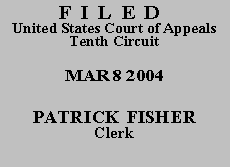

Debtors.
------------------------------------------
COMMERCIAL FINANCIAL SERVICES, INC.; BRADLEY D. SHARP, Trustee of the CFS Liquidating Trust,
Plaintiffs-Appellees,
v.
MIKE C. TEMPLE, an individual,
Defendant-Appellant.
______________________________
In re: MIKE C. TEMPLE,
Petitioner.
Appellant Mike C. Temple is the defendant in an adversary proceeding filed in the bankruptcy of appellee Commercial Financial Services, Inc. He filed this appeal to challenge the district court's interlocutory order denying his motion to withdraw the reference to the bankruptcy court. The district court decided that appellant had waived his right to a jury trial in the district court by waiting until nine months after his jury demand to file a motion to withdraw the reference. See Pet'n for Writ of Mandamus, Tab I at 2. In his stay motion filed in No. 03-5122, appellant seeks an order from this court staying the June 2004 bench trial scheduled in the bankruptcy court. In his mandamus petition, No. 04-5019, he seeks an order directing the district court to withdraw the reference so that he can have a jury trial in the district court.
This court's precedent makes clear that a district court's order denying a motion to withdraw the reference is interlocutory and not immediately appealable as a collateral order. See Dalton v. United States (In re Dalton), 733 F.2d 710, 714-15 (10th Cir. 1984). Appellant concedes as much, but says that the district court's order states that the order is final, and so he filed this appeal, this stay motion, and this mandamus petition to protect his rights. As he acknowledges, however, the district court's characterization of its order is not binding on this court. Kaiser Steel Corp. v. Frates (In re Kaiser Steel Corp., 911 F.2d 380, 385 (10th Cir. 1990). We agree. Under Dalton, the district court's interlocutory order is not final or immediately appealable.
Appellant seeks alternative relief through mandamus. Although we considered this alternative in Dalton, we concluded that the writ is unavailable in the usual case because of the availability of appeal from a final judgment. 733 F.2d at 717. We held that "[t]he remedy of a future appeal from a final judgment . . . is inadequate and therefore justifies mandamus only when the appeal is totally unavailable or when it cannot correct extraordinary hardship because of the particular circumstances." Id. (emphasis added). Appellant has alleged no such extraordinary circumstances here; he has alleged only that the lack of immediate review will cause him to go through a bench trial he does not want. We conclude that mandamus relief should also be denied.
Without jurisdiction over an appeal, this court may not grant a stay pending appeal. See Desktop Direct, Inc. v. Digital Equip. Corp., 993 F.2d 755, 756-57, 760 (10th Cir. 1993), aff'd, 511 U.S. 863 (1994). Accordingly, appellant's motion for a stay is denied.
Plaintiffs-appellees' motion to dismiss is granted and this appeal is DISMISSED. Defendant-appellant's motion for a stay pending appeal and petition for writ of mandamus are denied.
ENTERED FOR THE COURT
*. This order and judgment is not binding precedent, except under the doctrines of law of the case, res judicata, and collateral estoppel. The court generally disfavors the citation of orders and judgments; nevertheless, an order and judgment may be cited under the terms and conditions of 10th Cir. R. 36.3.